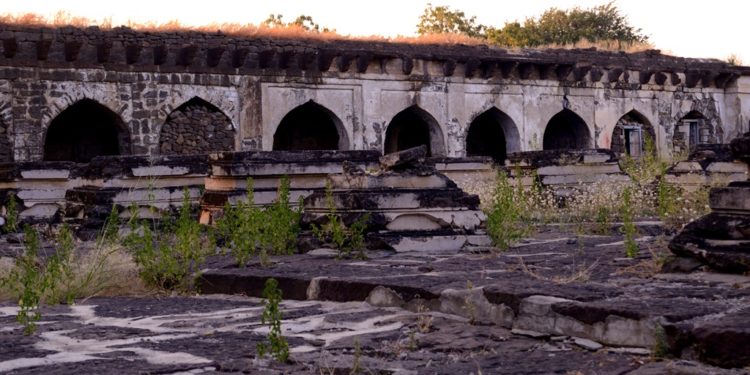
I had been on a whirlwind tour Bijapur in an auto rickshaw and everywhere I was greeted with mahals and mausoleums. While all of them were beautifully carved monuments, one of them was a bit of a “grave ” destination. And its isolated location matched a cold blooded tale as well. My last halt in Bijapur was Saat Kabar, a grave for sixty women.
I had heard of Saat Kabar only in books. I did not know if it actually existed. Even the auto driver who has been my guide for the day was not keen on taking me there. “ There is no one around and it is on a muddly lane. There is no road. You may have to go there walking on your own, ” he added, trying to dissaude me. But I have always been curious about dark, desolate places and stories that ring around them. So I persuaded him to take me there, even if it was rather isolated.
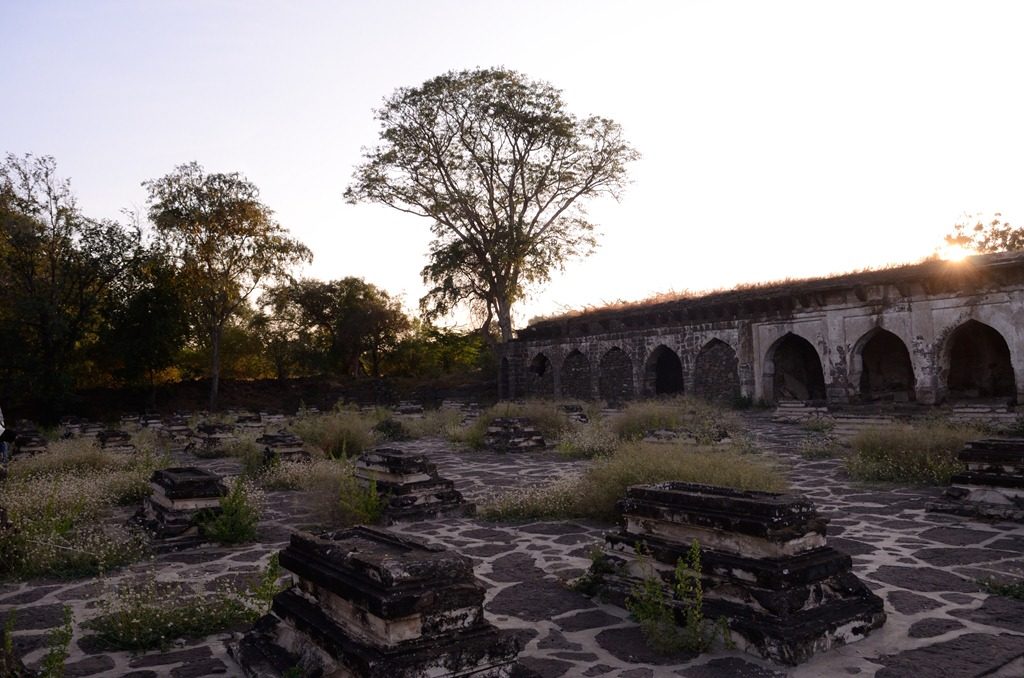
Saat Kabar – the grave of sixty women
The roads took us well beyond the dusty town. There were a few villages strewn around where kids were playing but I could see vast empty tracts of land sprawled in front of us. And then the auto abruptly stopped. In front of me were just a few clump of bushes. There was no path. My auto driver warned me of snakes as we walked through the wilderness
It was late evening and twilight had already set in . It seemed even dark as we walked through the dense undergrowth. Suddenly, I saw the crumbled remains of an old tower shrouded by branches of a tree. It was brick red in colour and there was no path to get there. Towering in front of me, the the unkempt branches of the trees snaking towards it covered it.
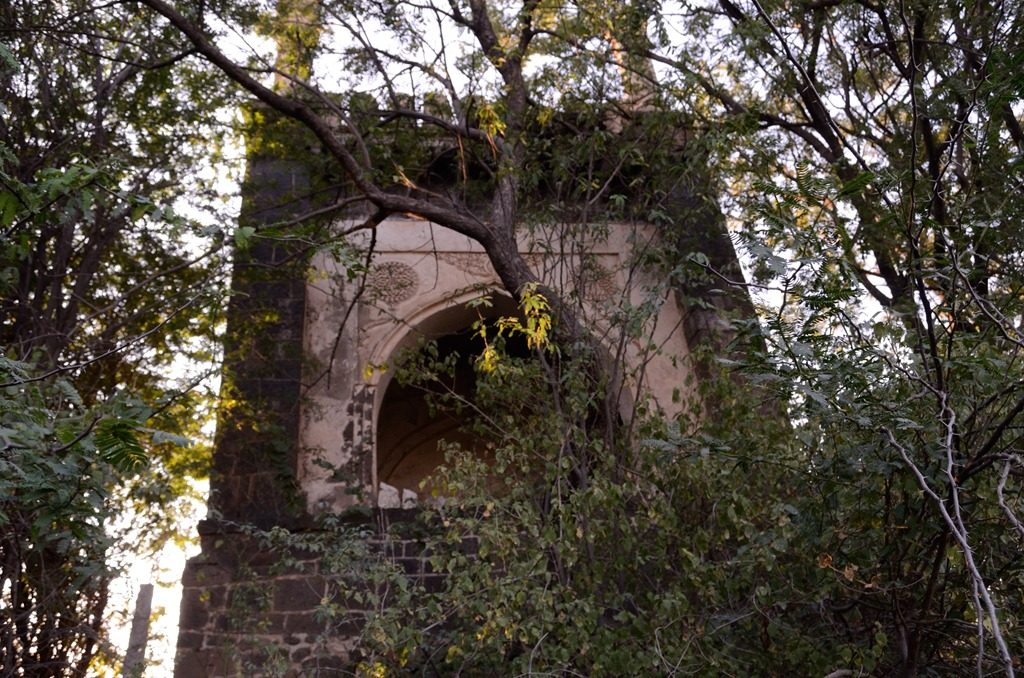
A tower peeps out of nowhere
The story of Saat Kabar or 60 graves refer to those of the murdered wives of Afzal Khan, the army chief of Adil Shahi 11. The silence was eerie. The graves told the gruesome story of how these women were killed by their own husband. The tale was set in the 17th century and we were taken to a battlefield, where a bitter war was fought between Chatrapathi Shivaji and Adil Shah 11 .
An astrologer apparently predicted that Afzal Khan would lose the battle and he would not survive the war.Angry, jealous and possessive, the commander decided that his wives would be killed by his own hand before he died so that they would not remarry. So he led these innocent women to the spot and pushed them into a well and killed them. According to the story, one of the wives tried to escape but she eventually met her fate as well. And these were the graves called Saat Kabar of these women.
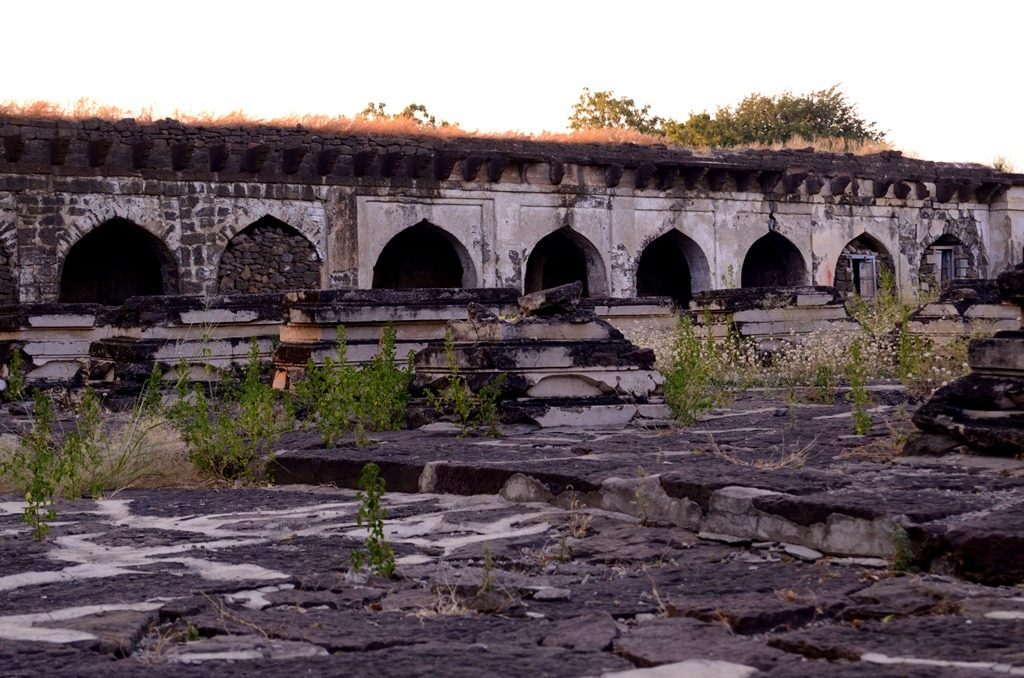
Saat Kabar – a silent epitaph for those women
We continued walking looking for these graves. All around me were just stunted bushes and thorny scrubs. It was virtually in the middle of nowhere with not a sould around. Suddenly I heard the call of my autodriver. We had walked into another vast open space but it was filled with several graves. made of black stone. There was no board but we knew we were at Saat Kabar. They were all maintained badly, some broken while others were open. Afzhal Khan wanted to be buried near his wives but he was killed right on the battlefield. We counted all sixty of them.
Saat Kabar or these graves were like a silent epitaph to these unfortunate. Darkness was slowly enveloping the landscape and the cold silence only added to the eerieness. One could almost imagine the screams of the women as they were pushed to their death. My auto driver insisted that we return and I slowly retraced my steps to the town, imagining what the last thoughts of these women were.

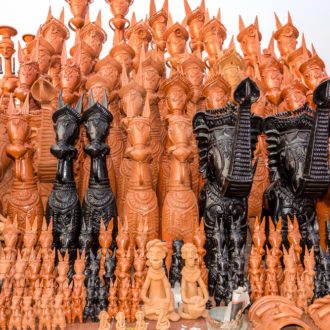
Wow! what a story! I have goosebumps.Very intriguing indeed.
http://renuka-mytraveldiary.blogspot.in/2013/01/my-kind-of-destination.html
Hi Lakshmi! back here after a long long time…so lovely to see you writing here, still. And love the fact that you share these stories with us…first read Saat Kabar on The Hindu site…don’t you think it should be saath kabar or 60? saat is seven no?
Very interesting
nice 1
;0
Read this in the Hindu and again here today… Goosebumps happened… cant even imagine what it must have been like back in the days..
nice blog.nice information you have share.thanks.
Fantastic. I always believe in going off the beaten track which enhances travel experience. here is a great example. Thanks for sharing.
A sad tale indeed but thank you for sharing it with us and making the effort to find the graves.
Sixty Graves, Unbelievable that a man killed his own wives just to because of fear of his commander. Great travel experience, Don’t you think that it was not only amazing but horrible too.
During ancient times, Bijapur was known as “City of Victory”.
A place with some historic glories and scary at the same time! Superb story, Ireally liked it.
exellent article that you must read…
Dear Madam,
Your Journey would have been wonderful….After going through your description about the place….I too thought to go there just to have a glimpse of that place, how its look like and why the Tourism Department has not till date made a road for the vehicle to go near that spot……Just amazing that being a ruler at that time…his mind was so narrow that he has killed all his family….
Regards,
Muhammad Ibrahim
Well, that adds to the mystery of the place, dont you think ?
Wow! What a history to that place. Thinking about it makes me feel squeamish:-)
Yes, it does feel very eerie out there..
22-11-2015 Eenadu daily Sunday book, at page.22, gave an account of the graves of the 65 queens of Afjal Khan. How cruel he was, to through alive his 63 queens into the well, and the escaping 2 queens were also killed by his soldiers. Earlier, in Andhra Bhumi Telugu daily paper, the article was published, a year back. How cruel were the rulers.
I come from this place called “Bijapur” earlier known as Vijayapur (City of Victory), and again re gained its old name Vijayapur recently. This place Saat (60) kabar (grave) depicts the cruelty of Afzal Khan. He was strong believer in Astrology and predictions during those days. He was insisted that, he would not return alive in the next meeting with Chatrapati Shivaji. He was very strong follower of Islam, who did not like his wives to remarry after his death, hence killed all of them. 1 wife escaped, later chased down by his men killed her at a place near by the city. Out of 60 graves one remains vacant to depict the escaped wife.